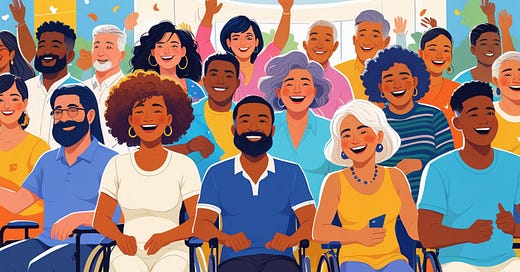There’s a quiet war underway. It does not announce itself with tanks or tear gas, but with bills in statehouses, edits to syllabi, and silent retreats by institutions that once professed courage. The target? Diversity, Equity, and Inclusion: three words now at the center of America’s most fevered backlash.
Once, these were the language of progress. Now, they’re branded with suspicion: “woke ideology,” “reverse racism,” “DEI bureaucracy.” Acronyms always make it easier to kill ideas.
But before we surrender these terms to their critics, we must ask: what do they truly mean?
Diversity is not just demographics. It is not a rainbow on a brochure or a slogan on a homepage. It is the presence of Black, Indigenous, immigrant, queer, and disabled histories that have long been ignored or erased. It is the story of the many woven into a single national fabric. True diversity disrupts. It challenges dominant narratives. It is not comfortable. Nor should it be.
Equity is more than equality. It is not about giving everyone the same thing; it’s about giving people what they need to thrive. Equity recognizes that history has been uneven; that some have been excluded from education, from housing, from safety, by design. Equity demands repair, not just representation. It demands that we acknowledge the ledger of injustice and act accordingly.
Inclusion is not tokenism. It is not the optics of progress. Real inclusion means restructuring power, not decorating it. It means voices at the table who can actually change the menu, not just be present while the meal is served.
So why are these principles under attack?
The answer is simple: because they work.
They work in universities, where students begin to question inherited truths and explore buried histories. They work in media, where voices once silenced are heard and where complexity is given space. They work in workplaces, where policies rooted in fairness begin to challenge old hierarchies.
And that is precisely the threat.
Legislators in several U.S. states have banned DEI offices in public universities. Some have prohibited professors from discussing systemic racism or gender identity. At the same time, media outlets are being told to “balance” discussions of equity with voices that often deny the existence of injustice altogether. Corporate DEI programs are being slashed under the guise of neutrality. History is being edited. Language is being sanitized.
But this backlash is not really about bureaucracy. It’s about memory. About power. About who gets to define the nation’s story.
To attack DEI is to pretend that justice already exists. That the playing field is level. That the past is irrelevant. That racism is over. That gender discrimination is solved. That everyone had the same starting line.
It’s a seductive myth, especially for those who have long benefitted from inequity.
But the truth is stubborn. The truth knows that public schools in Black and brown neighborhoods are still underfunded. That women still earn less. That Indigenous communities still lack access to clean water. That trans people are still criminalized for existing.
And DEI at its best is a mirror held up to that truth.
Those who oppose it say it’s divisive. But what’s really divisive is a system that excludes and then calls any effort at inclusion an overreach. They say it’s ideological. But what ideology is more radical than pretending history doesn’t matter?
Let’s be honest: the discomfort over DEI is not because it has failed, but because it has begun to succeed. It has opened doors. It has shifted conversations. It has made those in power just uneasy enough to strike back.
And so, the war continues: not against an acronym, but against a vision. A vision of a society where everyone has a fair shot. Where history is taught in full. Where no one is forced to beg for dignity.
This is not a culture war. It is a struggle over the soul of democracy.
If we let these words be turned into weapons, we lose more than a policy. We lose the possibility of a better future. So we must defend them: not as slogans, but as commitments. As unfinished work. As acts of collective memory, of necessary reckoning, of radical hope.
Because the real danger was never DEI.
The real danger is a society that forgets why it ever needed it.




